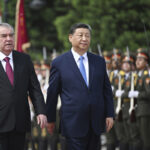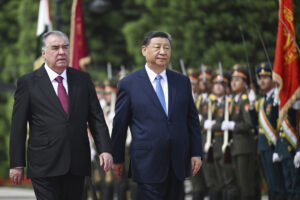Signing up to ‘strategic competition’ with China by joining Pillar II of the Aukus security agreement would make New Zealand’s future less safe
Opinion: Before the climate crisis, we feared annihilation by nuclear war. Public opinion and anti-nuclear activism were so strong last century that the Labour government of David Lange passed legislation in 1987 banning nuclear-armed or powered warships from our territorial waters.
Such boldness didn’t destroy our relationship with our Anzus friends, Australia and the US. No subsequent government has suggested repealing the act. The Ministry of Foreign Affairs and Trade’s website boasts:
“The fight against nuclear weapons provides one of the most sustained examples of the independence with which New Zealand has crafted much of its foreign policy.”
Things have changed – except for the nukes. Our foreign policies are mired in the immediate uncertainties of global trade and believing our security lies with allegiance to the bloc of western democracies.
We’re now part of that section of Nato-support countries known as the Indo-Pacific Four – Australia, Japan, New Zealand and South Korea. Some critics interpret the use of “Indo-Pacific” in preference to “Asia-Pacific” as a way of excluding China or at least as a change in emphasis.
Geopolitics appears separate from trade. China is our largest trading partner in goods and our second largest overall including services. The free trade agreement we signed in 2008 was the first China had with a developed nation, and our two-way trade is now worth more than $40 billion.
‘Strategic competition’ is a loaded phrase with strong overtones of dominance and, in this context, of polarising militarisation. I fail to see how ‘deeper collaboration’ would make us safer
That year we also signed an environment cooperation agreement in which we agreed to work with China on water quality in rural areas, chemical pollution and biodiversity.
Since 2014 we’ve had the New Zealand-China climate change action plan which enables us to share information on carbon markets and emissions trading schemes. This was updated in 2017 to an Action Plan.
This week we had the China Business Summit organised in Auckland by the Auckland Business Chamber to advance this part of our relationship.
At the summit Prime Minister Chris Hipkins referred to “the enormous benefits of our independent foreign policy, our role as an honest broker, and the importance of our close relationships in enhancing our prosperity and security”.
This relationship “serves a valuable purpose in an environment of geo-strategic competition”, he added.
Our relationship with China would surely become more complicated if we were to join Pillar II of Aukus, the security agreement between Australia, the UK and the US. This would mean participation in what the US-basedCentre for Strategic and International Studies describes as “strategic competition with China in which the race to develop and deploy emerging technologies will play a decisive role”.
Pillar II partners are involved in “developing and providing joint military capabilities … This is a generational opportunity for deeper collaboration with …our closest allies”.
“Strategic competition” is a loaded phrase with strong overtones of dominance and, in this context, of polarising militarisation. I fail to see how “deeper collaboration” would make us safer.
Moreover, we could face pressure to increase our current defence spending of 1.4 percent of GDP which is considerably less than that of our Aukus friends. Australia’s purchase of submarines has lifted their military spending from 2 percent to 2.2 percent, which matches that of the UK – still far from the 3.5 percent of the US.
Fortunately, the debate continues among our political elite. Supporters advocate for potential economic and security benefits and the need to keep up with rapidly changing technologies in the civil and military spheres.
Opponents foresee the loss of real independence in our foreign policy and are surely justified in asking how compromised our policies might be as a non-nuclear member already of two organisations involving nuclear states – Nato (“global partner”) and the Five Eyes intelligence-sharing agreement.
Negative impacts are also possible on our relationships with our Pacific neighbours who have always been strong supporters of our nuclear-free stance. The Pacific is our patch and China is already a presence there, increasing aid and development assistance among some small island states whose major anxieties concern the sea-level rise that is reducing their land area and is likely ultimately to threaten their existence.
Climate change was a peripheral issue for Hipkins in his speech to the business summit, which he mentioned only three times – twice in the context of “other areas” of cooperation. “We will look to cooperate with China, in areas where it is in our interests to do so … and to tackle critical global issues such as climate change and environmental protection.”
Business, it seems, will continue as usual for some time yet. China’s carbon dioxide emissions grew 4 percent in the first quarter of 2023 (compared with a year earlier) because of the country’s economic rebound after Covid, analysts believe. But the climate has also played a role. Severe drought has reduced the capacity of their hydro dams, and though wind and solar have made record increases, so have approvals for coal-fired power stations.
Strategic competition and a race to deploy emerging technologies are not the pathway to a safer future. The need for friends rather than competitors will become more acute as extreme weather reduces resources, especially the ability of nations to feed their populations.
We need to cultivate those areas in our relationship with China – working together, as Hipkins noted in his speech on Monday, on environmental protection and climate change – that promise real security for this uncertain future. Hipkins may have to be bold if pressure increases for us to join Pillar II of Aukus.
Source : News Room















